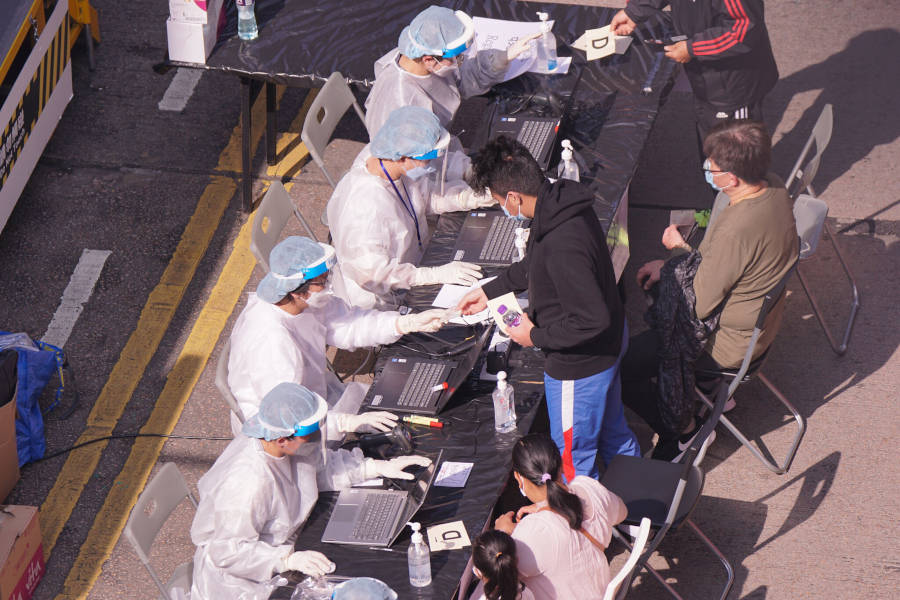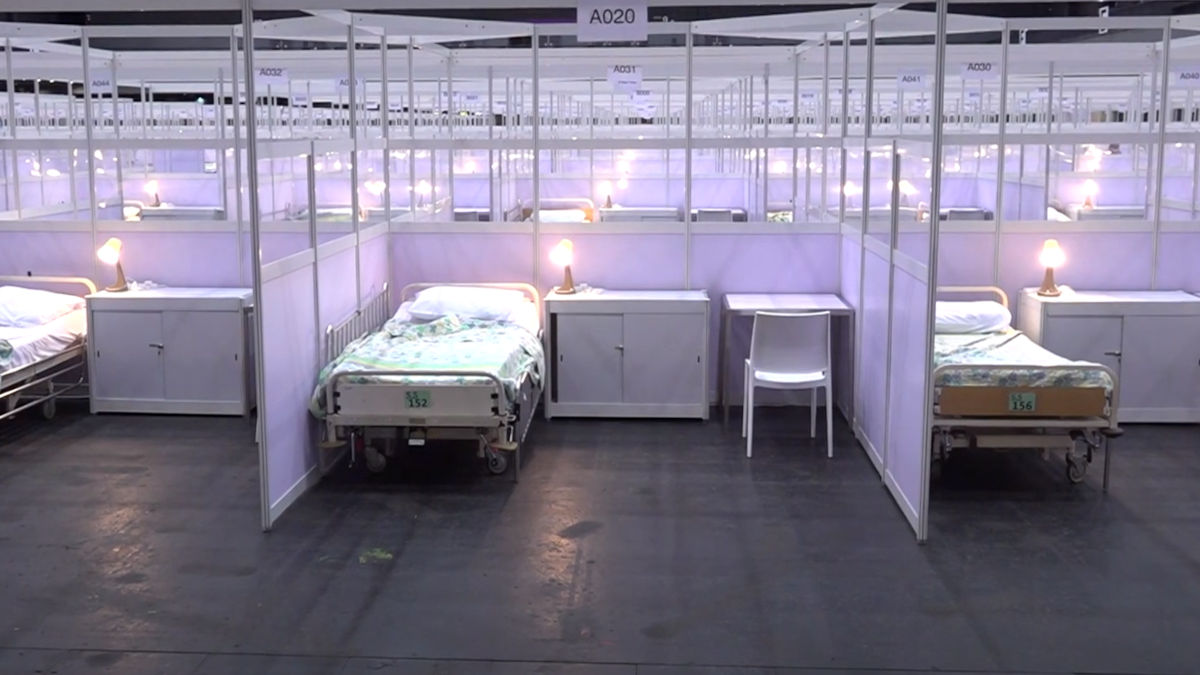As there are still a sizeable number of people who contract Covid-19 in Hong Kong, the city’s residents are concerned about what will happen to them if they either test positive for the virus or are deemed close contacts of a confirmed Covid-19 patient. Here, find out what to expect if you test positive for the virus or are a close contact of someone infected with the virus.
Note: While the information provided here is accurate at the time of writing, the situation is changing regularly and rapidly and this article may not always be up-to-date. Refer to the government’s official guidelines for the most updated information: StayHomeSafe Scheme and where to get tested/what to do if you test positive.
What happens if you test positive for Covid-19?
From September 26, inbound travellers no longer have to quarantine at a hotel after they arrive in Hong Kong. Once they land at the airport, they must first undergo a PCR test and are then free to leave for their homes or hotels, where they can await their results. If the result is positive, they will be issued a red health code, which will prohibit them from entering public places in the city.
Those who test positive for the virus after undergoing a nucleic acid test at a community testing centre or mobile specimen collection station can report their health status on this website and will be added to the Covid-19 Admission Allocation System. Anyone in the community who tests positive on a RAT and reports it to the government should declare their Covid-positive result on this website.
Confirmed patients are isolated in different facilities, depending on the severity of their symptoms. The following applies to incoming travellers and residents with no recent history of overseas travel:
- Patients in critical condition and in need of hospitalisation: Anyone infected with Covid-19 who is deemed in critical or serious condition, who are elderly, or who have chronic ailments are sent to public hospitals.
- Patients in relatively stable condition: These patients are sent to the North Lantau Hospital Hong Kong Infection Control Centre (HKICC) and community treatment facilities, such as the one at AsiaWorld-Expo.
- Asymptomatic patients: These patients who do not need medical attention are sent to different isolation facilities depending on the amount of non-Covid care they need.
- Isolation facilities and holding centres for the elderly: These facilities are for patients who require care support.
- Isolation facilities with individual units: These facilities are for patients admitted with carers or family members.
- General isolation facilities: These facilities are for able-bodied patients who can care for themselves.
- Designated clinics and home isolation: Patients who test positive at home using a rapid antigen test and who exhibit mild symptoms such as a fever, sore throat or runny nose can stay at home until they are transferred to a hospital or community isolation facility. In the interim, they can make bookings at a designated clinic for Covid-19 confirmed cases for treatment. Home quarantine under the StayHomeSafe scheme is an option for patients who are asymptomatic or mildly symptomatic and who fulfill certain criteria, such as having access to a separate toilet and bedroom and not co-habiting with a high-risk individual (elderly people, pregnant women or chronically ill patients with low immunity). These patients are issued a red health code and an electronic tracking bracelet to ensure that they do not leave their homes during their isolation period.

What happens to recovered arrivals who test positive for Covid-19 on their arrival PCR test?
International arrivals who have contracted Covid-19 abroad must present certain documents upon arrival at the airport to prove that they were infected and have subsequently recovered from the virus. The Department of Health can allow an arriving traveller who tests positive for Covid-19 on their arrival PCR test and who has recovered from the virus within the past three months to stay at their homes if they meet the StayHomeSafe criteria, or at their hotels at their own expense. The decision is made based on data in the PCR test result and the individual’s recovery record.
What happens if my child tests positive for Covid-19?
The Hospital Authority has said that children infected with the virus who are in stable condition can remain at home. If they need hospitalisation, they will be transferred to a paediatric isolation facility in a public hospital.
In addition, if parents or carers have also tested positive and are well enough to care for a hospitalised child, they may be allowed to stay with the child if there is enough room in the ward. However, parents or carers are not advised to stay with children if they test negative. Special considerations are made for requirements such as direct breastfeeding. Parents and carers will have to sign consent forms and follow the hospital’s infection-control measures.
Unvaccinated children who test positive for Covid-19 during their isolation period at a quarantine hotel and are mildly symptomatic or asymptomatic are sent to an isolation facility along with one parent for 14 days.
When can you get discharged after testing positive for Covid-19?
Covid-19 patients can be discharged based on the following criteria. Note that these rules only apply to individuals who have gotten at least two doses of a Covid-19 vaccine. If you have gotten only one dose or haven’t gotten vaccinated, no matter if you’ve been hospitalised or are staying at an isolation facility, the minimum time until you can be discharged is 14 days.
- Hospitalised patients: Hospitalised patients who test negative and are asymptomatic seven days after they first test positive can return home for another seven days of isolation, provided they do not live with elderly people, pregnant women or chronically ill patients with low immunity (i.e. high-risk individuals). They must stay at the hospital if they test positive on the seventh day or cannot return home. On Day 14, if they return another negative nucleic acid test, they can be discharged.
- Patients at community isolation facilities: Patients at isolation facilities, including international arrivals, who return a negative RAT on their sixth and seventh days can be discharged. They must stay at the isolation facility if they test positive on the seventh day or cannot return home. After this, they must take RATs every day and can only be discharged when they test negative two days in a row.
- International arrivals: If an overseas passenger tests positive during their three-day medical surveillance period via PCR or RAT, they are issued a red health code and may stay at home or at their hotel until they complete their recovery period. The day after testing or when the positive sample was collected is counted as Day 1 of their recovery period. The discharge criteria for international arrivals are the same as local cases.
International arrivals who test positive for Covid-19 and patients who contracted the virus in Hong Kong can declare their negative RAT results here. The earliest you can declare your results is Day 7 after your initial positive test result. Hospitalised patients who have been discharged may also declare their results on the same website. Once you’ve completed the declaration, your health code will change to blue and you can move around the city without any restrictions.
When does my home isolation period end?
The isolation period for people who contract Covid-19 within Hong Kong and who are cleared for home quarantine under the StayHomeSafe scheme is 14 days. Those who have received two doses of a Covid-19 vaccine may complete their isolation period earlier if they test negative on Days 6 and 7 on an antigen test. If they test positive on these days, they must continue to isolate at home and undergo daily RATs until they test negative for the virus on two consecutive days. Once patients under home isolation complete their quarantine period, they can remove their electronic tracking wristbands and uninstall the StayHomeSafe app.
What happens if you’re a close contact of a local case?
The Hong Kong government defines close contacts of confirmed Covid-19 patients as anyone who:
- Lives with the confirmed case in the same household.
- Has had face-to-face close contact with the confirmed case, especially in instances when the patient did not wear a mask (e.g., having meals together).
A confirmed patient’s close contacts are traced from two days before the patient began exhibiting symptoms of the virus. For asymptomatic patients, the tracing period begins from two days before patient’s Covid-positive specimen was collected.
Close contacts of confirmed patients who test positive for any Omicron subvariants can isolate at home, provided that they meet the StayHomeSafe criteria. If the home environment is not deemed suitable for isolation, close contacts will be sent to government isolation centres.
What happens if you’re a close contact of an imported case?
If you have travelled into Hong Kong with a companion or family member who tests positive for Covid-19, you are considered a close contact and must undergo quarantine either at home or at your hotel. If you live with the confirmed patient, you can isolate at home if you can stay in a separate bedroom and use a different bathroom than that of the patient. In addition, you must not be in a high-risk group, i.e., elderly, pregnant or have co-morbidities.
When can close contacts end their isolation period?
If you are double-vaccinated and test negative on a RAT on Days 6 and 7 (or two successive days thereafter) after the confirmed patient’s initial positive result, you may end your isolation period. However, if you are unvaccinated or have received only one shot of a Covid-19 vaccine, you must isolate for 14 days.
What happens to recovered Covid-19 patients who get a Compulsory Testing Notice?
Recovered Covid-19 patients who have tested positive within the past three months either via PCR or RAT and reported it to the Department of Health are exempt from mandatory testing if they get a Compulsory Testing Notice. They must also provide proof of their recovery so that they do not have to undergo compulsory testing. This does not apply to recovered patients who have not reported their positive RAT results to the government.
💡 More guides & news on the pandemic 💡
Header image credits: China News Service via WikiCommons, CC BY 3.0




